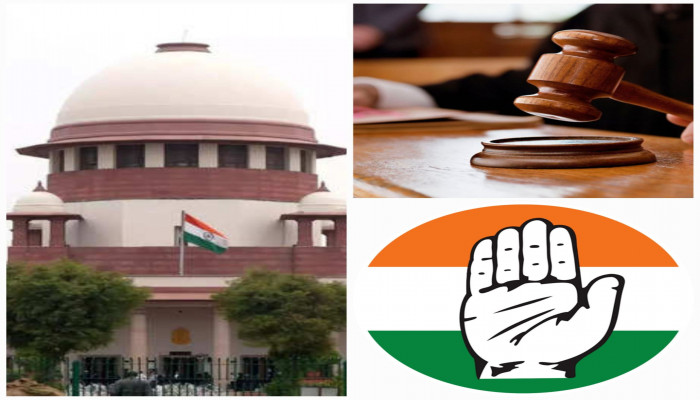Congress moves SC seeking intervention in 1991 Places of Worship Act cases
- In Reports
- 11:11 PM, Jan 17, 2025
- Myind Staff
On Thursday, the Indian National Congress filed a petition with the Supreme Court, seeking its intervention in cases challenging the validity of the Places of Worship (Special Provisions) Act, 1991. The Act aims to maintain the religious character of places of worship as they were on August 15, 1947, and is at the centre of ongoing legal disputes.
The Congress party argued that Parliament enacted the Places of Worship Act (POWA) to reflect the will of the Indian people and is crucial for upholding the country’s secular principles. Given that the Congress, through its elected representatives, was instrumental in introducing and passing the Act, the party believes it should be allowed to intervene in the case to defend its legal validity.
"The POWA had been envisaged before 1991, and the same was made a part of the Congress' then-election manifesto for the Parliamentary elections. The POWA is essential to safeguard secularism in India, and the present challenge appears to be a motivated and malicious attempt to undermine established principles of secularism," as per the application.
The Congress party has sought the Supreme Court's intervention in the ongoing petitions that challenge the validity of the 1991 Places of Worship Act. In its petition, the party aims to highlight the constitutional and social importance of the Act "as it apprehends that any alterations to it could jeopardise India's communal harmony and secular fabric, thereby threatening the sovereignty and integrity of the nation."
"Applicant (Congress) seeks to oppose the present challenge to Sections 2, 3, and 4 of the Act because the POWA plays a pivotal role in furthering the right to freedom of religion and protects secularism, which is an established basic feature of the constitution," the application mentioned.
The Congress party intends to make critical submissions supporting the outright dismissal of petitions that challenge the 1991 Places of Worship Act. In its intervention, Congress seeks to address several issues raised in ongoing cases before the Supreme Court, emphasising the need to maintain the Act’s integrity and purpose.
The Supreme Court is currently considering multiple petitions that challenge various provisions of the Act, specifically Sections 3 and 4, arguing that these violate fundamental rights such as the right to equality and the freedom to practice religion.
The 1991 Act was implemented to prevent any alteration to the religious nature of existing places of worship and imposes severe penalties for violations. On December 12, the Supreme Court issued a directive restraining all courts across the country from passing any interim or final orders, including conducting surveys, in cases involving religious structures currently under dispute. The Court also ruled that no new suits could be filed concerning these issues while deliberating on the challenges to the Places of Worship Act.
Various public figures and organisations, including Maharaja Kumari Krishna Priya, BJP leader Subramanian Swamy, former MP Chintam Malviya, retired army officer Anil Kabotra, religious figures like Swami Jeetendranand Saraswati, and advocates such as Chandra Shekhar and Ashwini Upadhyay have filed the petitions before the Supreme Court. These petitioners argue that the Places of Worship Act infringes upon the rights of Hindus, Jains, Buddhists, and Sikhs, particularly their ability to restore places of worship and pilgrimage sites that invaders destroyed.
On the other hand, Muslim organisations, including Jamiat Ulema-i-Hind, the India Muslim Personal Law Board, and the Anjuman Intezamia Masjid, which manages the mosque in the Gyanvapi complex, have filed applications seeking the enforcement of the Places of Worship Act. These groups argue that allowing challenges to the Act would lead to widespread litigation that could target numerous mosques across India. AIMIM President Asaduddin Owaisi has also approached the Supreme Court, urging the enforcement of the Act.
The petitioners opposing the Places of Worship Act have argued that allowing the current challenges to the Act could lead to a wave of litigation targeting numerous mosques throughout India. As part of their intervention in the case, they have called for the dismissal of the petitions that seek to challenge the Act’s provisions.
The Hindu petitioners' petition challenging the 1991 law said, "This law excludes the birthplace of Bhagwan Ram but includes the birthplace of Bhagwan Krishna, even though both are incarnations of Bhagwan Vishnu, who is the creator and is equally worshipped all over the world."
These petitions have contested the constitutional validity of Sections 2, 3, and 4 of the Places of Worship (Special Provisions) Act of 1991. The challengers claim that the Act violates the core principles of secularism and the rule of law, which are essential components of the Indian Constitution’s Preamble and its basic structure. Furthermore, they argue that the Act effectively strips citizens of their right to seek judicial remedy by closing the avenue to the courts.
Section 3 of the law prohibits the conversion of places of worship. It says, "No person shall convert any place of worship of any religious denomination or any section thereof into a place of worship of a different section of the same religious denomination or of a different religious denomination or any section thereof."
Section 4 prohibits filing any lawsuit or initiating any legal action aimed at changing the religious nature of any place of worship as it stood on August 15, 1947.







Comments